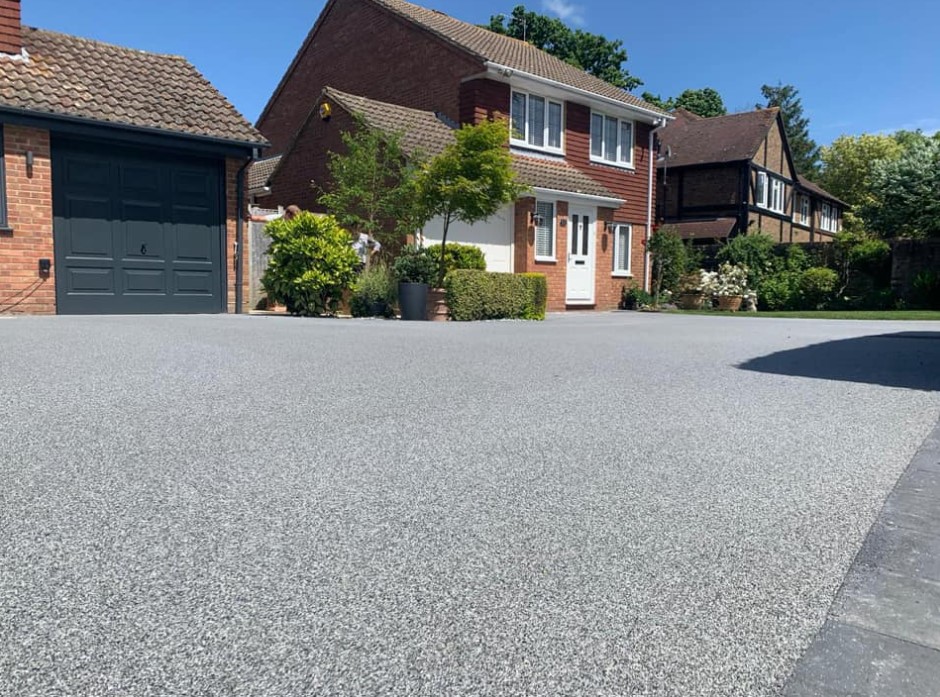If you’re in the market for a new driveway, you may have come across the term “resin driveway.” A resin driveway is a popular option for homeowners looking for a low-maintenance, durable, and visually appealing option. In this article, we’ll take a closer look at what a resin driveway is, how it’s installed, its benefits, and its potential drawbacks.
What is a Resin Driveway?
A resin driveway is a type of driveway made by mixing aggregate (such as gravel) with a resin binder. The resulting mixture is poured onto a prepared surface and then leveled and smoothed to create a hard, even surface. The resin used in the mix is typically a two-part epoxy resin, although other types of resins can also be used.
Resin driveways are available in a variety of colors, textures, and patterns. This means that they can be customized to fit a wide range of aesthetic preferences and styles. Some popular options include solid colors, multicolored mixes, and patterns that mimic the look of natural stone or other materials.
How is a Resin driveway Installed?
The installation process for a resin driveway typically involves the following steps:
Site Preparation: The area where the driveway will be installed is excavated and leveled, and any necessary drainage or other preparations are made.
Aggregate and Resin Mix: The aggregate (such as gravel) and the resin binder are mixed together in a large mixing drum or machine. The exact proportions of each component will depend on the specific product being used.
Pouring: The mixture is poured onto the prepared surface, either by hand or using a specialized pump or machine. The mixture is then leveled and smoothed to create an even surface.
Curing: The mixture is left to cure and harden for several hours or days, depending on the specific product being used. Once it has cured, the surface is ready to be used.
What are the Benefits of a Resin Driveway?
There are several benefits to choosing a resin driveway over other options, including:
Low Maintenance: Resin driveways are easy to maintain and require little upkeep. They don’t require sealing or repaving, and they can be easily cleaned with a power washer or hose.
Durability: Resin driveways are highly durable and can last for many years with proper care. They are resistant to cracking, fading, and other types of damage that can occur with other types of driveways.
Customization: Resin driveways are available in a wide range of colors, textures, and patterns, making it easy to create a customized look that fits your personal style.
Safety: Resin driveways are slip-resistant, making them a safer option than some other types of driveways, especially in wet or icy conditions.
What are the Potential Drawbacks of a Resin Driveway?
While there are many benefits to choosing a resin driveway, there are also some potential drawbacks to consider. These include:
Cost: Resin driveways can be more expensive than other types of driveways, especially if you choose a customized design or pattern.
Installation: The installation process for a resin driveway can be complex and requires specialized equipment and expertise. This can result in longer installation times and higher installation costs.
Environmental Concerns: Some types of resin binders can contain harmful chemicals that can be released into the environment during installation or over time. It’s important to choose a product that is environmentally friendly and safe for use.
Maintenance: While resin driveways are generally low maintenance, they can become stained or discolored over time, especially if exposed to oil or other substances.
An Overlook
A resin driveway is a popular option for homeowners looking for a low-maintenance, durable, and visually appealing option. Made by mixing aggregate with a resin binder, resin driveways are available in a variety of colors, textures, and patterns. The installation process for a resin driveway involves site preparation, mixing of aggregate and resin, pouring the mixture onto the prepared surface, and allowing it to cure and harden.
Resin driveways offer several benefits, including low maintenance, durability, customization, and safety. However, there are also some potential drawbacks to consider, such as higher cost, complex installation, environmental concerns, and the need for occasional maintenance.
Before deciding on a resin driveway, it’s important to consider your budget, aesthetic preferences, and specific needs. It’s also important to choose a reputable and experienced contractor who can ensure that the installation is done properly and safely.
Overall, a resin driveway can be a great investment for homeowners who are looking for a long-lasting, low-maintenance, and visually appealing option for their driveway. With proper care and maintenance, a resin driveway can provide years of reliable service and add value to your home.
Conclusion
A resin driveway can offer many benefits to homeowners who are looking for a low-maintenance, durable, and customizable option for their driveway. While there are potential drawbacks to consider, such as higher cost and environmental concerns, the advantages of a resin driveway often outweigh the drawbacks.
If you are interested in installing a resin driveway, it’s important to choose a reputable and experienced contractor like SUDwell, the resin bonded slab company, who can ensure that the installation is done properly and safely. With their expertise and high-quality materials, you can have a beautiful and long-lasting resin driveway that adds value and curb appeal to your home.


